
Читайте также:
|
1st Speaker
1.
2. Are you very busy?
3. What does the word “penetrate” mean? (What’s the meaning of the word “penetrate”?)
4. can’t get the exact meaning.
5. Is this pronunciation correct? (Have I got the pronunciation correct?) Penetrate.
6. And now the meaning. Is “to cut through” a synonym?
7. Is it correct to say,
6. It means “to go through with some sort of difficulty”.
7. Not usually. There’s not enough difficulty, you see. Not unless the window were awfully dirty.
8. Yes, certainly. But, even then, it wouldn’t be very bright under the tree, would it?
9. It changes the meaning, I think. Without the preposition, it’s more like “to cut through”. For instance, we say, “The bullet penetrated the door.”
10. That’s right. A very difficult word indeed, isn’t it?
2nd Speaker
1.
2. No, what is it?
3.The meaning of “penetrate”...
4.Why, what’s wrong?
5.Quite right..
6.It’s more like “to go through with some difficulty”.
7.I’m afraid not. There must be some difficulty, you see.
8. I see. There must be difficulty. Is it right to say...?
9.That’s clear now. But what about the preposition? Is there always a preposition, or is it sometimes used without one?
MAKING AN APPOINTMENT
1st Speaker
1.Good afternoon, comrade Harris. I hope you’re not too busy...
2. This is my friend, comrade Stone.
3. Well, when can you come to inspect our Institute? It’s too late today, I suppose.
4. Well then, when can you come?
5.Tomorrow at four. Let me see...
6. Yes. You see I’m busy at four tomorrow. We’d better make it some other time.
7. Let’s make it the day after tomorrow at about twelve.
8. I’ll put it down, so I won’t forget.
9. No, no. Twelve is quite all right for us. Shall I telephone you before we come?
10.That’ll be fine. Good-bye.
8. You may, of course.
9.The meaning changes, I think... For example,...!
2nd Speaker
1. Not at all! Come in, won’t you?
2. How do you do, comrade Stone?
3. Yes, I’m afraid it is.
4. What about tomorrow, at four?
5. Perhaps you can suggest some other time, if that’s not convenient.
6. We can make it the day after tomorrow. Any time you say.
7. Good! At twelve then.
8. I hope this doesn’t break up any plans you’ve made.
9.Oh, that’s not necessary. I shall be waiting for you at twelve.
(I’ll be here all day.) (I’ll be ready whenever you come.)
10. Good-bye. Good-bye, Stone.
POSSIBLE VARIATIONS
1st Speaker
1. Hello, comrade Harris. We’re not interrupting you, I hope.
2. Let me introduce my friend, comrade Stone. (I should like you to meet my friend comrade Stone.)
3. When shall we see you at our Institute? (When are you coming to our Institute?) You won’t have time today, I suppose.
4. Then when will you come?
5.At four I don’t know...
6. Yes, I have an appointment tomorrow at four. Can’t we make it some other time?
7. Then suppose we say the day after tomorrow at twelve.
8. I’ll write it down.
9. No, not at all. (Not in the least.) Shall we ’phone you (ring you up) before coming?
2nd Speaker
1. No, not at all. (Not in the least.) Won’t you come in?
2. Pleased to meet you, comrade Stone.
3. I’m afraid not.
4. Perhaps tomorrow at four. (Tomorrow at four perhaps.)
5. Some other time perhaps, if that doesn’t suit.
6. If you like, the day after tomorrow. I’m free all day.
7. Good. At twelve.
8. I hope this doesn’t break up any plans you’ve made.
9. Oh, that’s not necessary. I shall be waiting for you at twelve.
(I’ll be here all day.) (I’ll be ready whenever you come.)
| Assignment 2. In this telephone conversation the telephone is working very badly and the man cannot hear what the girl is saying. So he always asks her to repeat what she has said. Learn by heart. |
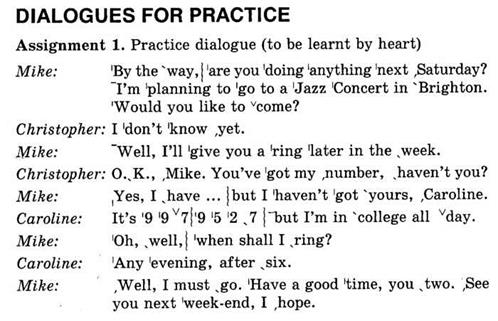
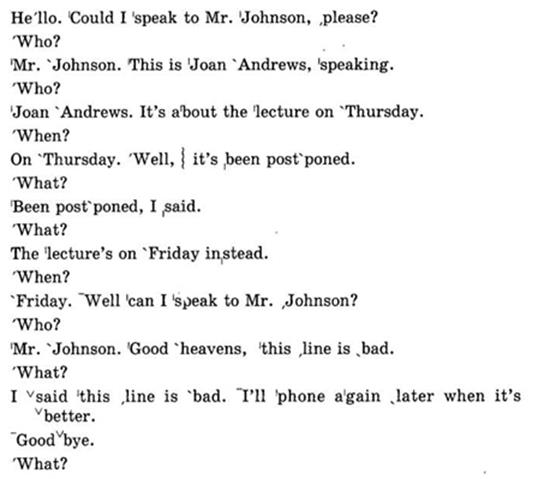
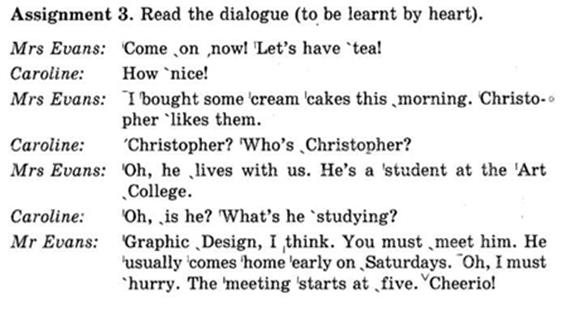
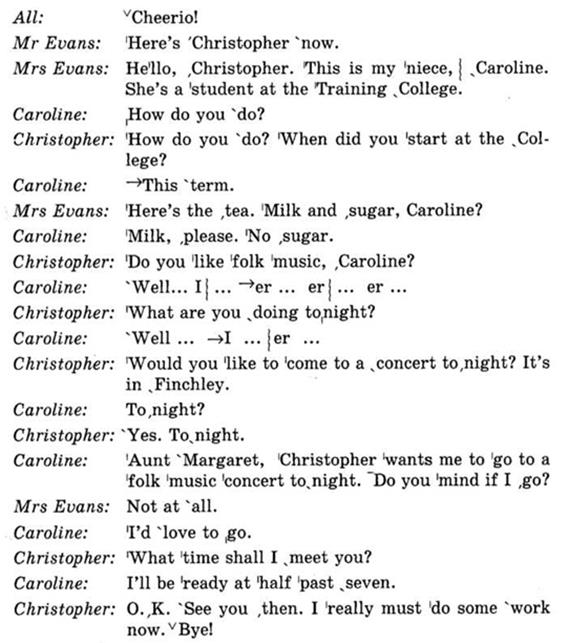














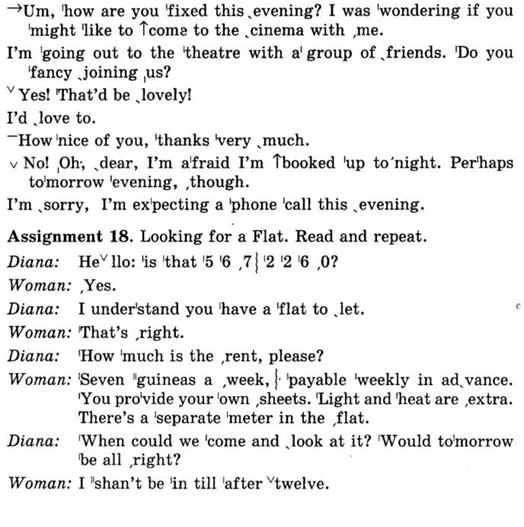




Дата добавления: 2015-10-26; просмотров: 73 | Нарушение авторских прав
| <== предыдущая страница | | | следующая страница ==> |
| Ex. 2. Practice the following stress patterns. | | | Как пользоваться этой книгой |